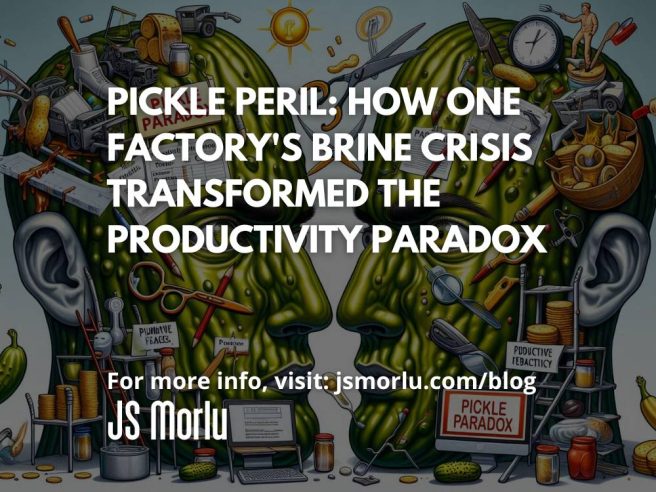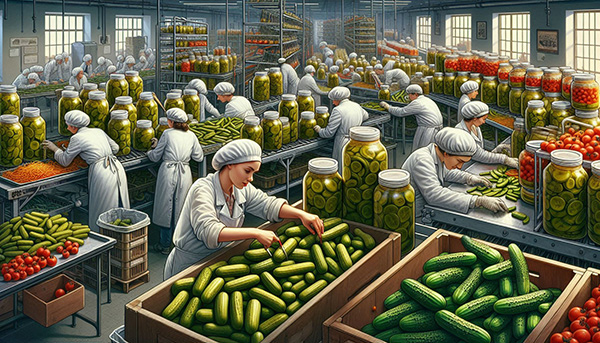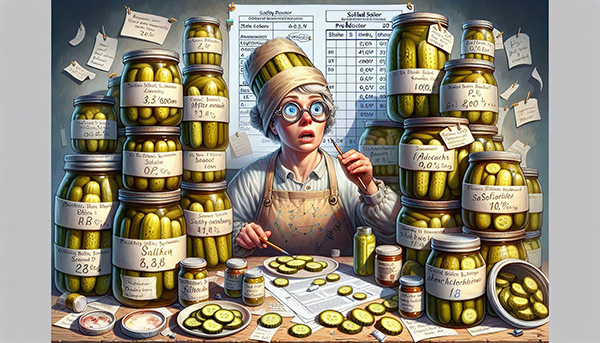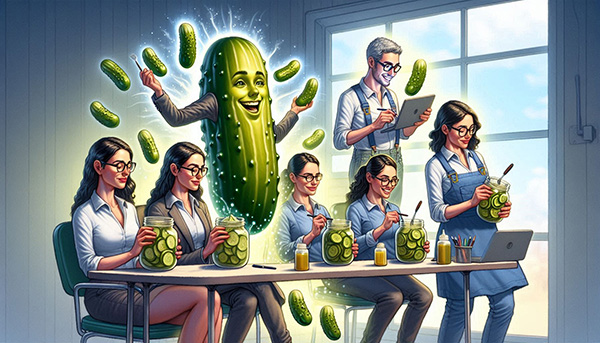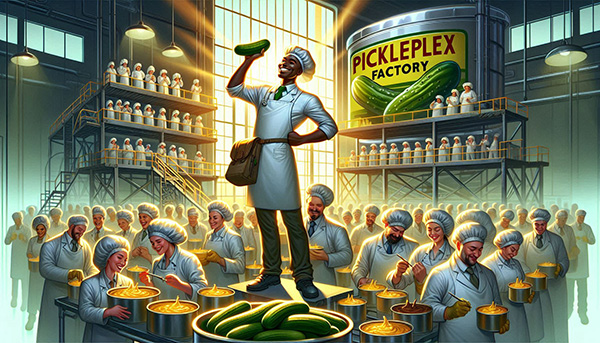By: John S. Morlu II, CPA
In today’s hyper-optimized world, where every minute of your day is tracked, analyzed, and dissected by an ever-growing army of productivity apps, one industry is discovering the absurdity of chasing perfection. Welcome to The Pickle Paradox, a hilarious and sharp-witted exploration of the chaos that erupts when the pursuit of efficiency goes hilariously wrong.
Picture this: a once-thriving pickle empire, PicklePlex, known for its artisanal cucumbers and briny innovations, now trapped in a web of its own making. Here, seasoned pickle artisans like Sally Salter are being transformed into frantic data-entry machines, obsessed with metrics rather than actually making pickles. And if that isn’t enough, the company’s new productivity app, BrineTime, has employees competing in ludicrous “Pickle Olympics” — complete with gold medals for the most jars labeled and the fastest brine throughput.
But the pickle pandemonium doesn’t stop there. Enter Gherkin’s Gourmet Goods, a beloved local pickle stand that finds itself drowning in the flood of productivity tools and metrics, leading to an ironic twist where the quest for efficiency becomes a recipe for disaster. Gerald Gherkin’s artisanal pickle stand, famous for its spicy dill spears with an attitude, now faces a crisis of its own, as the once-simple joy of selling pickles is overshadowed by endless data tracking and algorithmic chaos.
Through a series of uproarious chapters, The Pickle Paradox offers a front-row seat to the comedic disarray that ensues when companies become obsessed with measuring every facet of productivity. From disastrous “innovation naps” to the relentless pursuit of virtual unicorns on productivity apps, each chapter unravels the hilariously futile efforts to “optimize” every aspect of work.
This engaging and satirical saga invites you to dive into a world where productivity tools have become more important than the actual work being done. It’s a playful yet poignant reflection on how the quest for efficiency can sometimes lead to absurd and unintended consequences. As you follow the antics of Don Dill, Tom “TaskMaster” Gherkin, and their beleaguered employees, you’ll find yourself laughing at the all-too-familiar struggles of modern work life, while perhaps seeing a bit of your own productivity challenges reflected in their misadventures.
The Pickle Paradox is not just a story; it’s a mirror held up to the quirks of contemporary corporate culture, offering both entertainment and insight. Prepare for a rollercoaster of laughs, eye-rolls, and a few moments of profound recognition as you explore how the pursuit of productivity can sometimes turn even the simplest of tasks—like pickling cucumbers—into a grand comedic fiasco.
Chapter 1: The Great Pickle Crisis at PicklePlex
Welcome to PicklePlex, the titan of gourmet pickles, where cucumbers aren’t just pickled—they’re transformed into culinary art. Founded by Don Dill, a visionary with a penchant for the perfect pickle, PicklePlex once dazzled the world with its briny delights. Don was known for his avant-garde approach to pickling, claiming that cucumbers aged in Himalayan salt barrels under the light of a full moon were imbued with a “spiritual zest” that transcended ordinary taste.
But lately, PicklePlex has found itself in a comedic conundrum of epic proportions. Productivity has plummeted faster than a jar of pickles in a toddler’s hands. The pickle line is stalled, jars are crooked, and the latest shipment of cucumbers has been sitting out so long that they’re now considered spa water. Yes, you read that right—spa water, not brine.
In a bid to turn things around, Don enlisted the help of Tom “TaskMaster” Gherkin, a self-proclaimed guru of productivity with an impressive resume of dubious achievements. Tom’s magnum opus, “Efficiency in Brine: How to Preserve Time Like You Preserve Cucumbers,” promised to revolutionize the pickle industry. His first grand scheme? The BrineTime app—a technological marvel that allows employees to track every jar, cucumber, and label with the precision of a Swiss watchmaker.
Tom introduced motivational slogans like “Don’t dilly-dally; just dill it!” and “Get briny or get behind!” to spur the team into action. The BrineTime app monitored metrics like “Pickle Processing Rate” and “Label Alignment Efficiency,” promising that with just a little more brine velocity, productivity would soar.
However, the app’s launch was anything but smooth. Employees were soon buried under an avalanche of notifications. The once-simple joy of pickling was now overshadowed by endless data entries. Kathy in Quality Control was juggling between optimizing “jar adhesion metrics” and deciphering the complex analytics of “cucumber crispness scores.” Meanwhile, Steve from Shipping was on the verge of a nervous breakdown trying to align his “pickled product throughput” with the app’s ever-changing benchmarks.
In a twist of irony, the pursuit of productivity had led to a complete standstill. The factory floor was a chaotic mess of half-filled jars and misaligned labels. The BrineTime app had turned into a digital tormentor, bombarding employees with metrics and alerts, while actual pickle production had come to a grinding halt.
As employees were driven to distraction by the relentless app notifications, Don Dill looked around and pondered a profound question: had the pursuit of efficiency become a briny booby trap? Could it be that in their zeal to optimize every last aspect of the pickling process, they had forgotten the very essence of what made PicklePlex great?
Tune in next as we dive deeper into the comedic mayhem that ensues, uncovering how the quest for perfect productivity leads to a truly unforgettable pickle paradox.
Chapter 2: The Pickle Paradox Unfolds
Enter Sally Salter, the venerable brine master of PicklePlex. Sally had been with the company for 25 years, back when pickles were simply pickled, jars were mason, and labels were handwritten—pure, unadulterated brine bliss. But recently, Sally found herself tossing and turning at night, haunted by the specter of BrineTime.
“I used to worry about whether my cucumbers were crunchy enough,” Sally lamented. “Now I’m knee-deep in tracking ‘pickle-to-brine ratios’ and ‘jar adhesion efficiencies.’ My brain feels like it’s been pickled in confusion!”
Sally wasn’t alone in her plight. The Pickle Paradox had taken root at PicklePlex, mirroring the infamous productivity paradox highlighted by Microsoft CEO Satya Nadella. While management accused employees of slacking off, the workers felt as if they were trapped in a never-ending loop of overwork.
In an effort to address this absurd situation, Tom “TaskMaster” Gherkin decided that the solution lay in a little healthy competition. Enter The Pickle Olympics, a new initiative aimed at “boosting morale and productivity” through thrilling feats of pickling prowess.
Tom’s grandiose vision included events like the Jar-Juggling Jamboree, where employees competed to see how many jars they could juggle without spilling a drop of brine, and the Speedy Labeling Showdown, where the goal was to label the most jars in under an hour—no time for tea breaks here!
Sally, now an unwilling participant in the Pickle Olympics, found herself in training as if she were preparing for the Olympics in Rio. She meticulously practiced labeling jars with the precision of a watchmaker, trying to break her own record for the fastest “jar-labeling marathon” while trying to avoid paper cuts that could rival battlefield wounds.
The work floor was a spectacle of competitive chaos. Martha from the Packaging Line was spotted racing around with jars like a caffeinated squirrel, while Jimmy from Quality Control set up a mock obstacle course to simulate “jar-breakage scenarios” and improve his reflexes. Even Tom Gherkin couldn’t resist getting in on the action, entering the Brine Chugging Contest—a highly unscientific event where participants competed to see who could drink the most brine in one gulp. Spoiler alert: Tom won, but the subsequent stomachache was monumental.
As if this wasn’t enough, BrineTime had evolved into a full-blown entertainment extravaganza, with leaderboard displays showing not just productivity metrics but also “brine points,” “jar speed records,” and the ever-important “pickle prestige.” Employees began to bond over their shared struggle, exchanging tips on how to maximize their BrineTime scores and sharing war stories from the label trenches.
Despite the absurdity of it all, the Pickle Olympics did foster an unexpected camaraderie among the staff. The competition, though far from effective in solving the productivity crisis, provided a much-needed distraction from the relentless demands of BrineTime. Sally, while still grumbling about the nonsense of it all, couldn’t help but feel a twinge of satisfaction as she watched her colleagues engage in impromptu pickle-themed dance-offs and storytelling contests about their brine mishaps.
Yet, beneath the laughter and camaraderie, a pressing question remained unanswered: had the endless pursuit of productivity metrics clouded the very essence of pickling? As Sally pondered this dilemma, she couldn’t help but wonder if, in their quest to optimize every aspect of their work, they had lost sight of what made their pickles—and their jobs—truly satisfying.
In the next chapter, we dive deeper into the comical fallout of the Pickle Olympics and explore whether the company can rediscover its pickling passion amidst the chaos of competition and metrics.
Chapter 3: The Dill-Emma
Across town at Gherkin’s Gourmet Goods, owner Gerald Gherkin (not to be confused with Tom Gherkin, although they share a love for pickles) was grappling with his own pickle predicament. Gerald’s artisanal pickle stand, renowned for its spicy dill spears infused with “an attitude that could kick-start your day,” had seen a baffling drop in foot traffic.
“I don’t understand,” Gerald said to his loyal but beleaguered assistant, Lenny Lactoferment. “We’re offering dill spears with custom labels, barrel-aged in Icelandic lava caves, and pickled with tears of joy. How can productivity be down?”
Lenny, a veteran of the pickle world, had a theory that was as spicy as their dill spears. “Well, Gerald,” he began, scratching his head as he sifted through a mountain of unopened jars, “we’ve been so busy focusing on productivity tools that we’ve lost sight of actually, you know, making pickles. The PickleManagerPro 3000 you installed last month keeps crashing every time I try to track inventory. And don’t get me started on JarKeeper Plus—that app sends us notifications every ten minutes about ‘updating our jar metrics.’ I’m getting more alerts than orders!”
Gerald’s eyes widened in horror. “You mean to tell me that all these fancy productivity apps are turning us into a chaos of digital alerts?”
Lenny nodded solemnly. “Pretty much. We’ve become a pickle-making pit crew more focused on app updates than on actual pickling. According to one study, the average worker spends 11 hours a week just managing their productivity apps. That’s 11 hours I could’ve been spending perfecting our pickle recipes!”
As if to underscore Lenny’s point, the JarKeeper Plus app dinged with another notification: “Time to review your jar alignment metrics! Don’t let that brine settle for too long!” Gerald let out an exasperated sigh.
“It’s like we’re swimming in a sea of productivity tools while the actual product drowns in neglect,” Gerald mused. “I remember when pickling was a simple joy, not a game of digital whack-a-mole.”
The pickle industry seemed to be caught in a tidal wave of productivity apps that promised efficiency but delivered confusion. From automated brine calculators to jar alignment checkers, the industry was overloaded with tools that were supposed to optimize processes but ended up creating a labyrinth of digital distractions.
Gerald decided it was time for a drastic change. He called an emergency meeting with Lenny and the rest of the crew. “We’re going to do a digital detox,” Gerald announced. “No more productivity apps. Instead, we’ll focus on what made us great—making kick-butt pickles and connecting with our customers.”
The crew cheered as they shut down the apps that had become more of a nuisance than a help. They spent the rest of the day focusing on their craft: tweaking recipes, experimenting with new flavors, and reconnecting with the joy of pickling.
Without the constant barrage of app notifications, productivity increased naturally. Customers started flocking back to Gherkin’s Gourmet Goods, drawn by the tantalizing aroma of fresh pickles and the genuine passion of the team.
In the end, Gerald and his crew learned a valuable lesson: when productivity tools start overshadowing the core of your business, it might be time to step back and remember why you started in the first place. And so, with a renewed focus on pickling passion and customer connections, Gherkin’s Gourmet Goods reclaimed its spot as a local favorite.
Next up, we’ll dive into how the PicklePlex team reacts to Gerald’s newfound simplicity and whether they can untangle their own briny mess without becoming overwhelmed by their own productivity paradox.
Chapter 4: Sally Strikes Back
Back at PicklePlex, the walls reverberated with a collective sigh of relief as Sally Salter decided she had had enough of the productivity charade. During one particularly droning BrineTime sync meeting, where the most thrilling highlight was an update on the “Jar Alignment Efficiency,” Sally stood up, her face set with steely resolve.
“I haven’t actually pickled a cucumber in three days!” Sally declared with a dramatic flourish. “All I’ve done is update metrics, review synergy reports, and optimize my ‘pickle-task throughput.’ I’m not a brine master anymore—I’m a glorified data-entry clerk!”
A wave of cheers erupted from the room. It turned out that Sally’s frustrations resonated with everyone. Kathy from Quality Control had spent the last week analyzing the statistical probability of a jar breaking, calculating the odds with the precision of a Vegas bookie. Meanwhile, Tom from Shipping had been so obsessed with maximizing his “PicklePoints” on BrineTime that he hadn’t managed to send out a single shipment. The only thing he’d been shipping was a flurry of unfulfilled productivity goals.
Even Tom “TaskMaster” Gherkin couldn’t deny it any longer. The productivity paradox was real, and his empire of efficiency was crumbling faster than a soggy cucumber left out in the sun too long. The irony wasn’t lost on him: he had set out to optimize productivity but ended up creating a circus of digital chaos.
Determined to reclaim the joy of pickling, Sally led a rebellion against the tyranny of BrineTime. She organized what she called the “Great Pickle Unplug,” an audacious plan to shut down all productivity apps for a day and rediscover the art of pickling. Sally envisioned a return to basics—no metrics, no alerts, just pure, unfiltered pickling.
The “Great Pickle Unplug” day arrived with fanfare and excitement. The factory floor buzzed with activity as employees embraced the opportunity to focus on actual pickling. Sally and her team began by creating pickles that had been forgotten in the frenzy of productivity metrics. They experimented with new recipes, engaged in friendly pickle-tasting competitions, and even had a pickle-pairing seminar with cheese and crackers.
As the day wore on, the factory came alive with the sounds of laughter and genuine conversation. Martha from the Packaging Line and Steve from Quality Control even engaged in an impromptu pickle-jar balancing contest, much to everyone’s delight. The absence of productivity metrics led to an explosion of creativity and camaraderie.
By the end of the day, it was clear that the factory’s output had surged not because of another app or productivity gimmick but because the employees were once again doing what they loved—making pickles and enjoying their work. The pickle jars were perfectly aligned, the labels were straight, and the brine was as flavorful as ever.
Seeing the success of the “Great Pickle Unplug,” Tom Gherkin had an epiphany. Perhaps, in his quest to create the ultimate efficiency machine, he had lost sight of the very essence of his company. The productivity paradox wasn’t just about numbers and metrics—it was about the joy of the work itself.
As the team gathered to celebrate their newfound pickle prowess, Sally looked around with a satisfied grin. She knew that while the productivity apps would eventually return, they would do so with a newfound appreciation for the simple, joyful act of pickling.
In the next chapter, we explore how Tom Gherkin attempts to rebuild his empire with the lessons learned from the Great Pickle Unplug, and whether he can balance productivity with passion in a way that truly benefits PicklePlex.
Chapter 5: A New Era of Pickling
In a dramatic turn of events, Sally Salter proposed a radical idea that made everyone at PicklePlex gasp collectively. “What if we just… stopped using the apps?” she suggested with a mix of daring and exasperation. “What if we got rid of all these fancy tools and just pickled the way we used to? You know, focus on making pickles?”
The room fell silent. Tom “TaskMaster” Gherkin actually fainted, collapsing into a pile of paperwork that had been printed out just for the latest productivity metrics. The sight of Tom lying there, surrounded by crumpled reports and half-eaten cucumbers, was so surreal that it almost seemed like a pickle-induced hallucination.
After a moment of stunned silence, a realization began to sink in. The employees of PicklePlex didn’t need BrineTime, PicklePoints, or JarKeeper Plus. What they truly needed was to reconnect with the simple joy of their craft. The fancy tools and endless metrics had clouded their ability to focus on what really mattered: making pickles.
With a collective deep breath and a few nervous chuckles, they decided to turn off the apps. The screen of BrineTime dimmed with an almost theatrical finality, as if it too was sighing with relief. JarKeeper Plus went silent, and PickleManagerPro 3000 was put to rest. The factory was eerily quiet as the hum of productivity apps was replaced by the pleasant sound of cucumbers plunking into brine.
The transformation was nothing short of magical. Sally’s pickling line, previously bogged down by endless data entry and optimization protocols, began to hum with renewed vigor. The cucumbers were now lovingly submerged in brine at record speeds, and each jar was filled with the kind of care that only comes from focusing on the task at hand rather than the metrics of it.
Kathy from Quality Control was back in her element, inspecting jars with the precision of a surgeon and the enthusiasm of a sommelier. Her quality checks were thorough, yet somehow less stressful without the constant interruptions from productivity apps. Her inspection was so meticulous, she even found the perfect pickle-to-brine ratio by sheer intuition.
Meanwhile, Tom from Shipping, who had previously been so absorbed in boosting his PicklePoints that he hadn’t managed a single shipment in weeks, finally got to work. For the first time in ages, boxes of pickles began to leave the factory floor. Tom even threw in a few extra jars as a bonus, realizing that a satisfied customer was worth more than a million PicklePoints.
As word of PicklePlex’s new approach spread, customers returned to the factory, eager to get their hands on the freshest, most delicious pickles. The once-dominant pickle empire was rediscovered and reinvigorated, no longer a cautionary tale of productivity gone awry but a beacon of how passion and simplicity can reignite success.
In an unexpected twist of fate, Gerald Gherkin at Gherkin’s Gourmet Goods experienced a revival of his own. With the chaos of productivity apps behind him, Gerald focused on what he did best—creating pickles that were spicy, delightful, and full of personality. The shelves once again emptied quickly as customers flocked to taste the rekindled magic of his spicy dill spears.
The success stories from both PicklePlex and Gherkin’s Gourmet Goods became legendary, proving that sometimes, in the pursuit of productivity, we forget the art and joy of what we do. The lesson was clear: efficiency without heart is just a hollow shell, but passion and simplicity can lead to extraordinary results.
As the sun set on this new era of pickling, both companies embraced their rediscovered purpose. The pickles flowed, the jars gleamed, and the employees beamed with pride. The productivity paradox had been resolved not through more metrics or apps, but through a return to the essence of their work.
In the next chapter, we’ll explore how the pickle industry at large reacts to these changes and whether the lessons learned at PicklePlex and Gherkin’s Gourmet Goods can inspire a broader revolution in the world of artisanal food production.
Chapter 6: The Final Brine
As PicklePlex basked in its newfound golden age, the factory hummed with a harmonious rhythm, free from the paralyzing grip of over-optimization and productivity apps. The transformation was so dramatic it felt like a pickle-flavored fairy tale.
Don Dill, the visionary founder of PicklePlex, surveyed his thriving empire with a contemplative smile. “Maybe true productivity isn’t about tracking every second,” he mused, admiring the factory’s vibrant, briny energy. “Maybe it’s just about getting the job done with passion and care.”
Under this new philosophy, employees relished their work as never before. Sally Salter, once a disgruntled brine master, had become a local legend. Her stand against the tyranny of productivity metrics had earned her a surprising accolade: a feature in Business Bites Weekly. The magazine hailed her as a cult hero who had single-handedly toppled the productivity gods and restored sanity to the pickle industry.
The article, “From Pickle Peril to Pickle Paradise: The Sally Salter Saga,” was an instant sensation. It depicted Sally as a fearless rebel who had taken a stand against the dark forces of productivity apps. Her famous quote, “I’m not a brine master anymore; I’m a glorified data-entry clerk!” became a rallying cry for workers everywhere who felt oppressed by endless metrics and meaningless data.
As Sally’s profile soared, she became the face of a burgeoning movement advocating for the human element in the workplace. Inspirational posters of her image, adorned with pickles and motivational slogans like “In Brine We Trust,” began popping up in offices across the nation. Her newfound fame even sparked a range of “Sally Salter” merchandise, from pickle-shaped stress balls to “I Survived the Productivity Paradox” T-shirts.
Meanwhile, the pickle industry at large looked on with a mix of awe and envy. The once-dominant trend of productivity apps and metrics began to wane as more companies recognized the value of focusing on the craft itself. The narrative shifted from a fixation on efficiency to celebrating the artistry and joy of work. It wasn’t just about producing more; it was about producing with heart.
The impact of PicklePlex’s revival extended beyond the pickle aisles. The factory’s success became a beacon of hope for businesses trapped in their own productivity paradoxes. Consulting firms and industry experts began to cite PicklePlex as a prime example of how to balance efficiency with passion, and how to reclaim the joy in one’s work without being ensnared by endless optimization tools.
As the golden era continued, PicklePlex thrived not only in terms of production but also in employee satisfaction. The factory’s culture of creativity and camaraderie blossomed, fostering an environment where innovation could flourish without the constraints of over-analysis. Employees found themselves more engaged and motivated, not by targets and metrics, but by the simple pleasure of doing their jobs well.
Don Dill’s musings turned into a company-wide mantra: “Get the job done, and do it with heart.” The factory’s success was a testament to the fact that while productivity tools and metrics have their place, the essence of true productivity lies in the genuine enjoyment and dedication of the people doing the work.
As PicklePlex continued to lead the way in this new era of pickling, it became clear that the real victory wasn’t just about overcoming the productivity paradox—it was about rediscovering the joy of work and celebrating the craft in every pickle jar. The great pickle crisis had been averted, and in its place, a new, refreshing approach to productivity had emerged.
In the next chapter, we explore how this revolutionary approach influences other industries and whether the lessons from PicklePlex’s pickle-powered renaissance can inspire a broader shift in the world of work.
Author: John S. Morlu II, CPA is the CEO and Chief Strategist of JS Morlu, leads a globally recognized public accounting and management consultancy firm. Under his visionary leadership, JS Morlu has become a pioneer in developing cutting-edge technologies across B2B, B2C, P2P, and B2G verticals. The firm’s groundbreaking innovations include AI-powered reconciliation software (ReckSoft.com) and advanced cloud accounting solutions (FinovatePro.com), setting new industry standards for efficiency, accuracy, and technological excellence.
JS Morlu LLC is a top-tier accounting firm based in Woodbridge, Virginia, with a team of highly experienced and qualified CPAs and business advisors. We are dedicated to providing comprehensive accounting, tax, and business advisory services to clients throughout the Washington, D.C. Metro Area and the surrounding regions. With over a decade of experience, we have cultivated a deep understanding of our clients’ needs and aspirations. We recognize that our clients seek more than just value-added accounting services; they seek a trusted partner who can guide them towards achieving their business goals and personal financial well-being.
Talk to us || What our clients says about us

